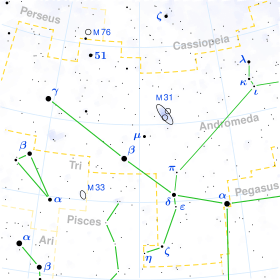V385 Andromedae
V385 Andromedae is a variable star in the constellation Andromeda, about 360 parsecs (1,200 ly) away. It is a red giant over a hundred times larger than the sun. It has an apparent magnitude around 6.4, just about visible to the naked eye in ideal conditions.
| Observation data Epoch J2000 Equinox J2000 | |
|---|---|
| Constellation | Andromeda |
| Right ascension | 23h 24m 08.868s[1] |
| Declination | +41° 36′ 46.35″[1] |
| Apparent magnitude (V) | 6.413[2] |
| Characteristics | |
| Evolutionary stage | Red giant |
| Spectral type | M0[3] |
| B−V color index | +1.66[4] |
| Variable type | LB[3][2] |
| Astrometry | |
| Proper motion (μ) | RA: -12.02 ± 0.31[1] mas/yr Dec.: 2.46 ± 0.29[1] mas/yr |
| Parallax (π) | 2.7775 ± 0.1334[5] mas |
| Distance | 1,170 ± 60 ly (360 ± 20 pc) |
| Details | |
| Radius | 113[5] R☉ |
| Luminosity | 1,843[5] L☉ |
| Temperature | 3,563[5] K |
| Other designations | |
| Database references | |
| SIMBAD | data |
V385 Andromedae was identified as a long-period variable in 1999 from analysis of Hipparcos photometry.[6] It was classified as a slow irregular variable,[3] but analysis of its light curve identified a possible 36 day period.[2] It varies by about 0.1 magnitudes.[2][3]
References
- van Leeuwen, F. (2007). "Validation of the new Hipparcos reduction". Astronomy and Astrophysics. 474 (2): 653–664. arXiv:0708.1752. Bibcode:2007A&A...474..653V. doi:10.1051/0004-6361:20078357.Vizier catalog entry
- Burggraaff, O.; Talens, G. J. J.; Spronck, J.; Lesage, A. -L.; Stuik, R.; Otten, G. P. P. L.; Van Eylen, V.; Pollacco, D.; Snellen, I. A. G. (2018). "Studying bright variable stars with the Multi-site All-Sky CAmeRA (MASCARA)". Astronomy and Astrophysics. 617: A32. arXiv:1806.02247. Bibcode:2018A&A...617A..32B. doi:10.1051/0004-6361/201833142.
- Samus, N. N.; Durlevich, O. V.; et al. (2009). "VizieR Online Data Catalog: General Catalogue of Variable Stars (Samus+ 2007-2013)". VizieR On-line Data Catalog: B/gcvs. Originally Published in: 2009yCat....102025S. 1: B/gcvs. Bibcode:2009yCat....102025S.
- Høg, E.; Fabricius, C.; Makarov, V. V.; Urban, S.; Corbin, T.; Wycoff, G.; Bastian, U.; Schwekendiek, P.; Wicenec, A. (2000). "The Tycho-2 catalogue of the 2.5 million brightest stars". Astronomy and Astrophysics. 355: L27. Bibcode:2000A&A...355L..27H.
- Brown, A. G. A.; et al. (Gaia collaboration) (August 2018). "Gaia Data Release 2: Summary of the contents and survey properties". Astronomy & Astrophysics. 616. A1. arXiv:1804.09365. Bibcode:2018A&A...616A...1G. doi:10.1051/0004-6361/201833051. Gaia DR2 record for this source at VizieR.
- Kazarovets, E. V.; Samus, N. N.; Durlevich, O. V.; Frolov, M. S.; Antipin, S. V.; Kireeva, N. N.; Pastukhova, E. N. (1999). "The 74th Special Name-list of Variable Stars". Information Bulletin on Variable Stars. 4659 (4659): 1. Bibcode:1999IBVS.4659....1K.
This article is issued from Wikipedia. The text is licensed under Creative Commons - Attribution - Sharealike. Additional terms may apply for the media files.
